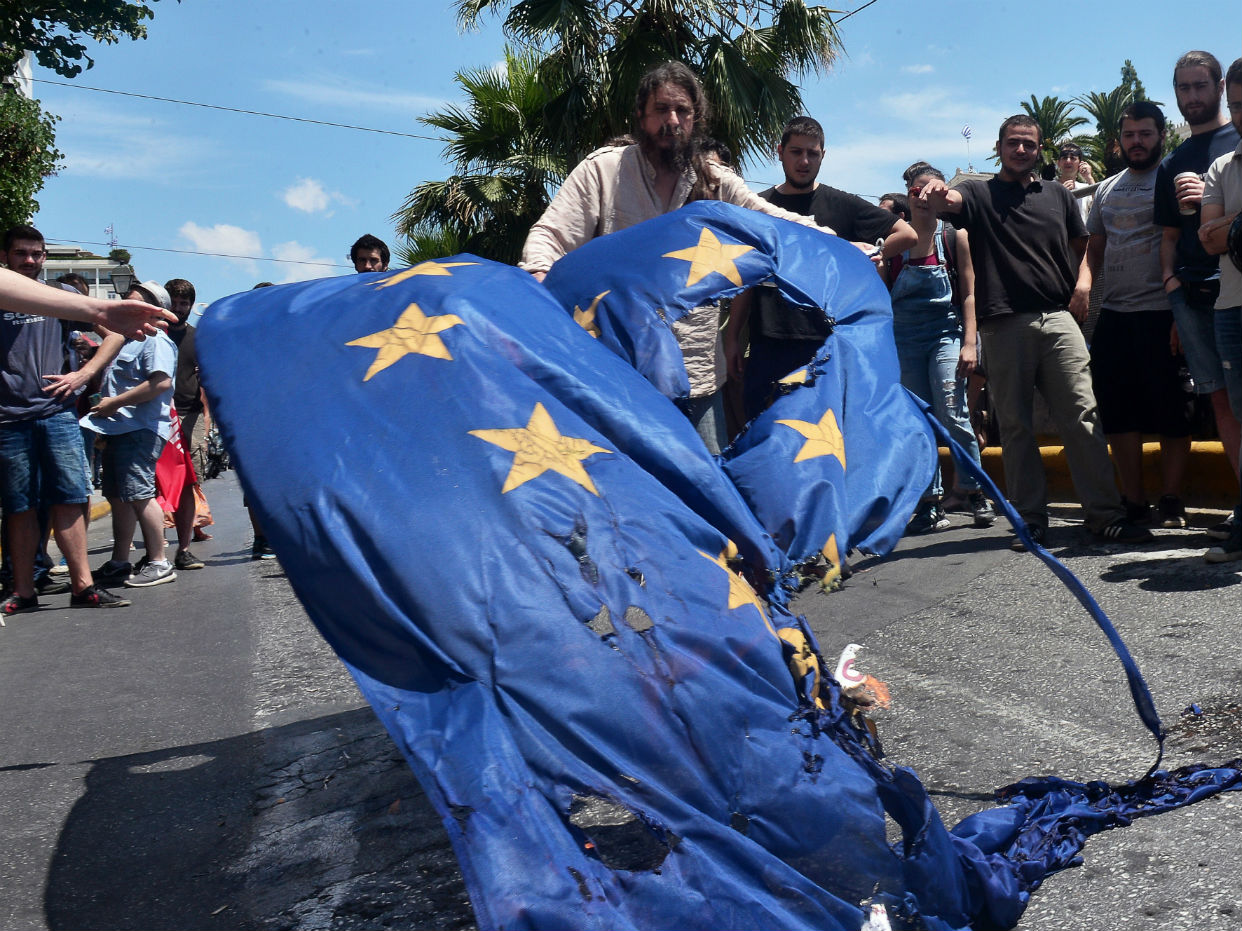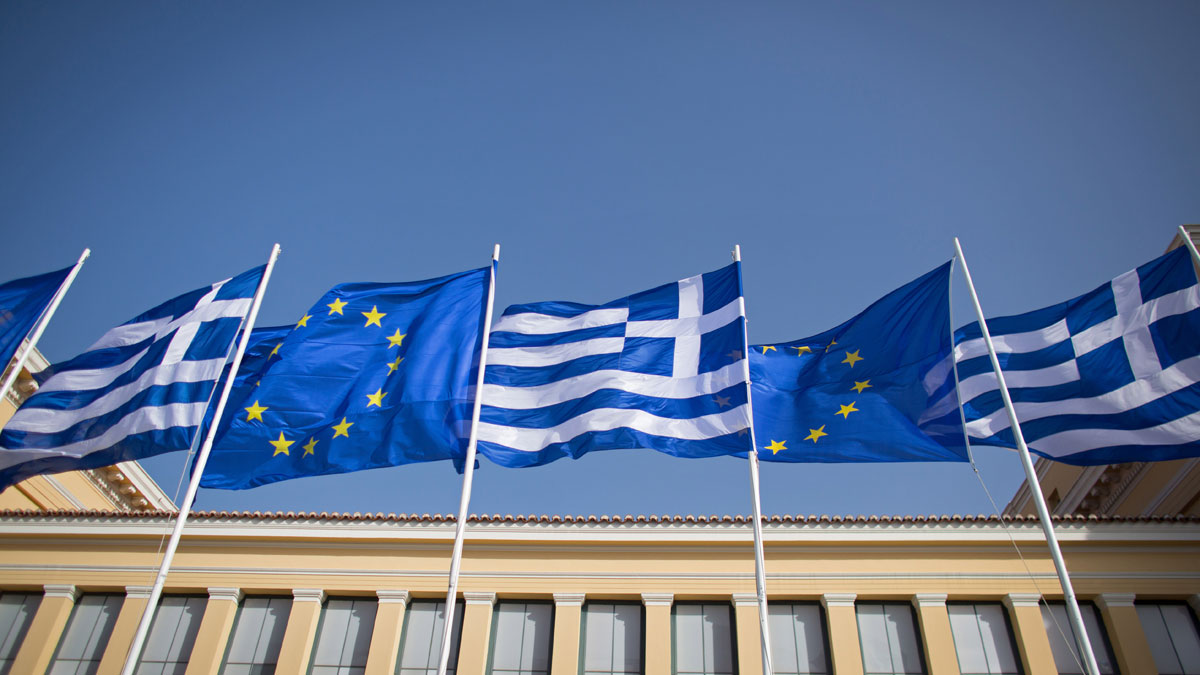Greece finally reaches deal to release €12bn bailout funds
ECB stress tests show country's banks needs €14bn to fill a capital shortfall

A free daily email with the biggest news stories of the day – and the best features from TheWeek.com
You are now subscribed
Your newsletter sign-up was successful
Greece crisis: six reasons bailout is 'not out of the woods'
13 August
Greece has finally done a deal with its creditors over a fresh €86bn bailout package. Whether it will survive the rigours of passing through parliaments at home and abroad, or stand the test of economic reality, remains to be seen.
Almost as soon as the European Commission concluded a press conference confirming a "technical" deal, critics began to pick holes in an agreement they say is based on overly optimistic economic targets and which still faces strong opposition
The Week
Escape your echo chamber. Get the facts behind the news, plus analysis from multiple perspectives.

Sign up for The Week's Free Newsletters
From our morning news briefing to a weekly Good News Newsletter, get the best of The Week delivered directly to your inbox.
From our morning news briefing to a weekly Good News Newsletter, get the best of The Week delivered directly to your inbox.
So what are the key remaining questions and how likely are they to scupper the bailout?
1. Is the International Monetary Fund on board?
On Tuesday the European Commission said the outline deal had been reached with the agreement of all parties, which implied the IMF was participating. But the Financial Times reports a draft of the bailout specifies the European Stability Mechanism, the EU’s rescue fund, would contribute up to €86bn of the funds – "that is the whole lot".
So is the IMF on board? At this stage it is unclear. It was certainly involved in negotiations, but may not decide if it is going to contribute funds until the autumn. If it doesn't the deal might be rejected by Germany, which has a blocking minority vote share in the ESM.
A free daily email with the biggest news stories of the day – and the best features from TheWeek.com
2. Will there be debt relief?
One of the key issues the IMF had raised was the need to lessen Greece's "unsustainable" debt burden, either through a cut in the face value of outstanding debt or through significant concessions on maturity dates. The New York Times notes the draft of the deal "offers no relief on Greece’s staggering debt" of €320bn, with talks on this apparently to follow later.
This fact alone prompted Yanis Varoufakis, the controversial ex-finance minister, to tell BBC radio the new programme "will not work".
3. Are the targets 'fantasy'?
Economists immediately poured scorn on the deal and said economic targets Greece has signed up to, while lessened significantly from previous demands, are unachievable. The country will be able to record a 'primary deficit' excluding debt repayments of 0.25 per cent this year, rising to a surplus of 0.5 per cent in 2016, 1.75 per cent in 2017 and 3.5 per cent in 2018.
The Daily Telegraph says Greek officials have claimed the deal would reduce targeted surpluses by 11 per cent of GDP over the next three years – but economists have argued that is purely the result of a renewed downturn in the economy. Jonathan Loynes, chief European economist at Capital Economics, is quoted in The Guardian saying the current contraction is "way below those seen even when the economy was contracting at annual rates of 9 per cent in 2010/11" and that the targets implied in the bailout are "little short of fantasy".
4. Will Germany play ball?
Germany has been the most hardline of international creditors and public comments from senior figures suggest it is no less so now. According to the FT the German government has already issued a note highlighting a series of "open questions" about the new bailout prior to a meeting of eurozone finance ministers on Friday, which must approve the deal if it is to pass in time for a first instalment to cover a €3.2bn bond repayment to the European Central Bank on 20 August.
The IMF and debt relief issues remain a concern and Greek newspaper Kathimerini says Angela Merkel's government is also thought to be balking at the timetable to get a deal done before 20 August. It has been widely reported an emergency bridging loan is being prepared in case the "political agreement" sought by the European Commission fails to come along in time. In particular Germany is concerned that reviews of key reforms, such as liberalising the labour market and establishing a €50bn privatisation fund, are being delayed until October and next March respectively.
5. Opposition at home?
Greek prime minister Alexis Tsipras has already called back MPs for a vote on Thursday, but he is facing opposition from the Left Platform faction of Syriza MPs. In the words of the group's leader Panagiotis Lafazanis, they believe the deal, involving no fewer than 40 new laws, is "a noose around the neck of the Greek people". It will pass, but if a major mutiny undermined the credibility of the government, planned early elections could be brought forward.
6. Will it survive a prolonged recession?
Even if the deal is done, whether it will last the full three-year term is questionable. The Wall Street Journal reports Greece is in the midst of a renewed recession that will see the economy shrink by 2.3 per cent this year and 1.3 per cent next year. Some suggest the contraction will be much worse and undermine any efforts to meet fiscal targets, especially as capital controls preventing businesses spending overseas are not expected to be lifted until September or October.
There is also a chance the appetite for austerity could fade among a population which has already rejected the bailout terms at a referendum. The Greek government has negotiated the ability to implement a "fiscally neutral" plan to top-up incomes to a minimum of €300 a month, but it is likely many Greeks will continue to face hardship in the austere years ahead.
Greece crisis: Tsipras could face confidence vote
14 August
Greece seemed to take another step back from the abyss on Friday morning, as bleary-eyed MPs rounded off an all-night parliamentary debate by conclusively voting in favour of an €85bn third bailout deal.
But despite the positive vote, achieved with a strong majority after 222 MPs voted in favour against 64 no votes, a larger-than-expected rebellion in the increasingly split ruling Syriza party is likely to force a confidence vote in Alexis Tsipras's government, potentially hampering efforts to secure wider political consensus for the latest rescue.
The Financial Times reports that out of 149 Syriza MPs, 31 voted against the package – "fewer than in two previous votes last month related to the bailout". As another 11 abstained, support for the governing party fell "well below the 120 level needed to sustain a minority government" under the country's constitutional rules.
According to The Independent, even when votes from the minority coalition partner are factored in, "by one calculation" the Government secured only 118 votes. This is expected to force Tsipras to call a vote, probably after 20 August when he expects the first instalment from the bailout to have been received and a €3.2bn bond to the European Central Bank repaid.
If he loses it could "trigger a snap election". The Guardian notes this will "not please" German negotiators as they prepare for talks with eurozone leaders today – and could even prompt the country to withhold support for the bailout until the political situation is clearer, due to the risk that a new Government may not follow through with reform pledges.
The alternative would be another temporary bridging loan, which reports have said is being prepared in case a "political agreement" is not forthcoming.
The latest drama comes on the day eurozone growth figures were published, showing that the bloc undershot expectations in the second quarter and grew at a meagre 0.3 per cent. Germany and Italy narrowly missed targets and the French economy stagnated after a strong start to the year.
Ironically, figures published on Thursday showed the Greek economy confounded expectations to record surprisingly strong growth of 0.8 per cent in the three-month period.
Greece crisis: 'political' assessment needed on bailout deal
11 August
Bailout talks between Greece and its international creditors have concluded with agreement on a "technical" deal, which must now be agreed by eurozone political leaders including Angela Merkel.
After negotiations that lasted through the night, Greek negotiators had claimed that an outline deal was reached this morning with only "two or three issues" remaining, The Guardian reports. The European Commission has since confirmed at a press conference that a "technical deal" is now in place, but that there must now be "political agreement" and "there are some small details that need to be finalised", according to the Daily Telegraph.
In return for an expected €85bn package of loans to meet payments over the coming three years, Greece will agree to softened economic targets including hitting a 'primary' budget surplus before debt repayments of 0.5 per cent in 2016, rising to 1.75 per cent in 2017 and 3.5 per cent in 2018.
Greek newspaper Kathimerini says it understands the deal involves no fewer than 35 "prior actions", or reforms demanded by creditors.
These include a review of the welfare system, phasing out early retirement, scrapping tax breaks for islands by the end of 2016, deregulating the energy market and proceeding with a privatisation program already in place.
The Guardian says the specifics of how to manage the proceeds from €50bn worth of privatisations remains a key issue to resolve.
The Telegraph cautions that Germany, which has maintained a more hardline stance towards Greece than others and has enough voting power in the eurozone's rescue fund to derail the bailout, could yet scupper the deal – although this appears unlikely, especially as the Commission has indicated the International Monetary Fund will participate in the package.
Jean-Claude Juncker, president of the European Commission will now hold a teleconference with Merkel and French president Francois Hollande later today, while eurozone deputy finance ministers will also hold a conference call. A deal is expected to be fully concluded by the end of the day.
-
 Touring the vineyards of southern Bolivia
Touring the vineyards of southern BoliviaThe Week Recommends Strongly reminiscent of Andalusia, these vineyards cut deep into the country’s southwest
-
 American empire: a history of US imperial expansion
American empire: a history of US imperial expansionDonald Trump’s 21st century take on the Monroe Doctrine harks back to an earlier era of US interference in Latin America
-
 Elon Musk’s starry mega-merger
Elon Musk’s starry mega-mergerTalking Point SpaceX founder is promising investors a rocket trip to the future – and a sprawling conglomerate to boot
-
 Majority of Greeks regret joining euro
Majority of Greeks regret joining euroSpeed Read Fifty-three per cent say it was 'wrong' to join single currency - and feeling is strongest among the young
-
 US stock markets fall after Greek vote
US stock markets fall after Greek voteSpeed Read Wall Street slide mirrors falls in Asia and Europe as global 'Grexit' jitters take hold
-
 'Leap' second: how much was it worth?
'Leap' second: how much was it worth?In Depth During yesterday's extra second, Apple earned about twice the average UK weekly salary
-
 Greek crisis: a case of history repeating itself
Greek crisis: a case of history repeating itselfIn Depth If Greece leaves the euro, it won't be the first monetary exit for the Hellenic Republic
-
 Greece crisis: has bailout ended threat of Grexit?
Greece crisis: has bailout ended threat of Grexit?In Depth Economic targets remain ambitious and the political situation is far from settled